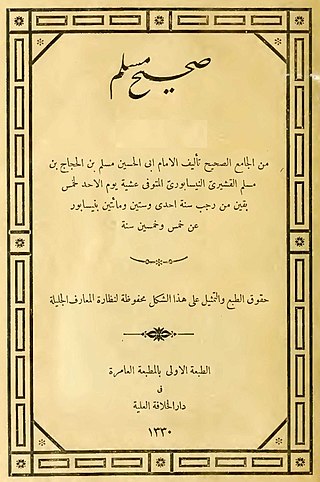
Hadith or Athar refers to what most Muslims and the mainstream schools of Islamic thought believe to be a record of the words, actions, and the silent approval of the Islamic prophet Muhammad as transmitted through chains of narrators. In other words, the ḥadīth are attributed reports about what Muhammad said and did.
Ashʿarism or Ashʿarī theology is one of the main Sunnī schools of Islamic theology, founded by the Arab Muslim scholar, Shāfiʿī jurist, Mujaddid imam (mujaddid), and scholastic theologian Abū al-Ḥasan al-Ashʿarī in the 9th–10th century. It established an orthodox guideline, based on scriptural authority, rationality, and theological rationalism.
Abdullah ibn Abd al-Muttalib was the father of the Islamic prophet Muhammad. He was the son of Abd al-Muttalib ibn Hashim and Fatima bint Amr of the Makhzum Clan.

Sahih Muslim is the second hadith collection of the Six Books of Sunni Islam. It was compiled by Persian scholar Muslim ibn al-Ḥajjāj.
Hudud is an Arabic word meaning "borders, boundaries, limits". In the religion of Islam, it refers to punishments that under Islamic law (sharīʿah) are mandated and fixed by God as per Islam. These punishments were applied in pre-modern Islam, and their use in some modern states has been a source of controversy.
Islamic religious leaders have traditionally been people who, as part of the clerisy, mosque, or government, performed a prominent role within their community or nation. However, in the modern contexts of Muslim minorities in non-Muslim countries as well as secularised Muslim states like Turkey, and Bangladesh, the religious leadership may take a variety of non-formal shapes.

Musnad Ahmad ibn Hanbal is hadith collection compiled by the Islamic scholar Ahmad ibn Hanbal to whom the Hanbali fiqh (legislation) is attributed.

Hadith studies consists of several religious scholarly disciplines used by Muslim scholars in the study and evaluation of the hadith—i.e. what most Muslims and the mainstream schools of Islamic sects believe to be a record of the words, actions, and the silent approval of the Islamic prophet Muhammad as transmitted through chains of narrators.
Ahl al-Ḥadīth is an Islamic school of Sunni Islam that emerged during the 2nd and 3rd Islamic centuries of the Islamic era as a movement of hadith scholars who considered the Quran and authentic hadith to be the only authority in matters of law and creed. They were known as "Athari" for championing traditionalist theological doctrines which rejected rationalist approaches and advocated a strictly literalist reading of Scriptures. Its adherents have also been referred to as traditionalists and sometimes traditionists. The traditionalists constituted the most authoritative and dominant bloc of Sunni orthodoxy prior to the emergence of mad'habs during the fourth Islamic century.
An-Nisa 4:34 is the 34th verse in the fourth chapter of the Quran. This verse adjudges the role of a husband as protector and maintainer of his wife and how he should deal with disloyalty on her part. Scholars vastly differ on the implications of this verse, with many Muslim scholars saying that it serves as a deterrent from anger-based domestic violence. The translation of the verse, which can read 'discipline them gently' is also subject to debate among Muslim scholars. According to a hadith transmitted by Abu Huraira, slapping someone across the face was forbidden.
The Jariri school is the name given to a short-lived Sunni school of fiqh that was derived from the work of al-Tabari, the 9th and 10th-century Persian Muslim scholar in Baghdad. Although it eventually became extinct, al-Tabari's madhhab flourished among Sunni ulama for two centuries after his death.
Sheikh Mohammed al-Ghazali al-Saqqa (1917–1996) was an Islamic scholar whose writings "have influenced generations of Egyptians". The author of 94 books, he attracted a broad following with works that sought to interpret Islam and its holy book, the Qur'an, in a modern light. He is widely credited with contributing to a revival of Islamic faith in Egypt in recent times. Another sources have called him "one of the most revered sheikhs in the Muslim world".
Punishment of the Grave is a Judeo-Islamic concept about the time between death and resurrection on the Day of Judgement. According to some hadiths, the souls of the unrighteous are punished by two angels in the grave, while the righteous find the grave "peaceful and blessed".
Abu Bakr Muhammad ibn Ishaq ibn Khuzaymah was a prominent Muslim Muhaddith and Shafi'i jurist, best known for his hadith collection, Sahih Ibn Khuzaymah.
The Shafi'i school is one of the four major schools of Islamic jurisprudence within Sunni Islam. It was founded by the Muslim scholar, jurist, and traditionist al-Shafi'i, "the father of Muslim jurisprudence", in the early 9th century.

al-Adab al-Mufrad is a topical book of hadiths collected by al-Bukhari addressing the question of perfecting Muslim manners.
Qutb ud-Din Ahmad ibn ʿAbd-ur-Rahim al-ʿUmari ad-Dehlawi, commonly known as Shah Waliullah Dehlawi, was an Islamic Sunni scholar and Sufi of the Naqshbandi order, who is seen by his followers as a renewer. He emphasized the importance of following Sharia and believed in the unification of Hanafi and Shafi'i schools of law, aiming to reduce legal differences.

Muḥammad al-Ṭāhir ibn ʿĀshūr was a graduate of University of Ez-Zitouna and a well known Islamic scholar. He studied classical Islamic scholarship with reform-minded scholars. He became a judge then Shaykh al-Islām in 1932. He was a writer and author on the subject of reforming Islamic education and jurisprudence. He is best remembered for his Qur'anic exegesis, al-Tahrir wa'l-Tanwir.
Muhammad Tawfiq Sidqi was an Egyptian Islamic scholar who argued against the authenticity of hadith. He is remembered today for his argument "that nothing of the hadith was recorded until after enough time had elapsed to allow the infiltration of numerous absurd or corrupt traditions"; and that God had allowed this to happen because the Sunnah of Muhammad as a whole "was only ever meant for the Arabs of the Prophet's time", as only the Quran was necessary for Islam,. Sidqi recanted his position after Rashid Rida opposed his position.




